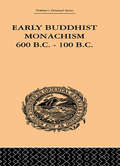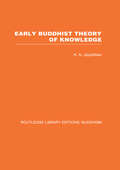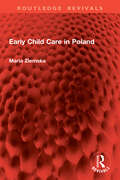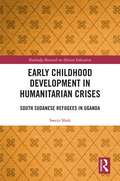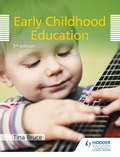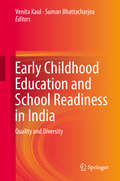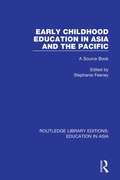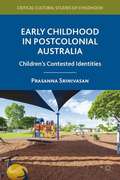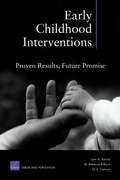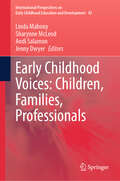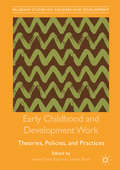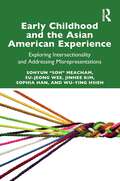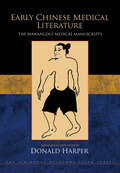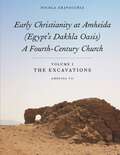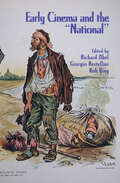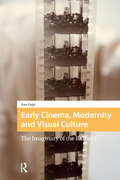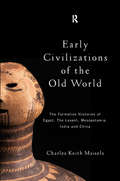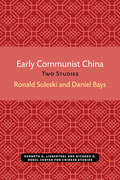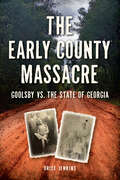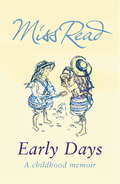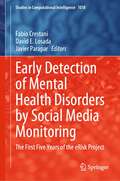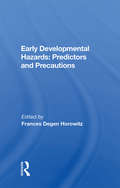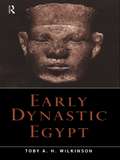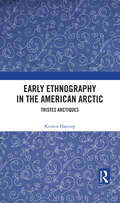- Table View
- List View
Early Buddhist Monachism: 600 BC - 100 BC
by Sukumar DuttFirst Published in 2000. Routledge is an imprint of Taylor & Francis, an informa company.
Early Buddhist Theory of Knowledge
by K N JayatillekeThe author of this volume, an accomplished philologist, historian and philosopher, analyzes the relevant earlier and later texts and traces the epistemological foundations of Pali canonical thought from the Vedic period onwards. Originally published in 1963, it sheds new light on later developments and elucidates from the Indian point of view some of the basic problems of the conflict between metaphysics and logical and linguistic analysis.
Early Child Care in Poland (Routledge Revivals)
by Maria ZiemskaFirst published in 1978, Early Child Care in Poland provides an authoritative and detailed look at the complex array of services and provisions which constitute in Poland the partnership between State and family for the care and upbringing of the young child. The enormous physical devastation of Poland during World War II required almost complete rebuilding of many cities and villages, but even more debilitating was the loss of human life. The needs of the children, great numbers of them left without parents, were of the highest priority to the Polish people.The book discusses important themes like children and its development, compact between family and society, general planning of family, training of personnel, information on child rearing, and research on infant and pre-school child. This is an important historical reference work for researchers of social work, and psychology.
Early Childhood Development in Humanitarian Crises: South Sudanese Refugees in Uganda (Routledge Research on African Education)
by Sweta ShahThis book provides an analysis of Early Childhood Development (ECD) in South Sudanese refugee camps in Uganda, making the case for the design and implementation of programmes for ECD in emergency situations. Illustrating the current place of ECD in the humanitarian landscape and the environment in which South Sudanese refugees in Uganda currently live, this book combines child and human development perspectives to underpin the importance of ECD in emergencies. Developing an ECD tool specific to the cultural context and emergency situation, the author examines the outcomes of an ECD programme focused on refugee children and provides evidence for increased investment into ECD in emergencies. Contributing to the evidence base for Early Childhood Development, this book will be of interest to students, scholars and practitioners who conduct research on ECD, education or humanitarianism in developing countries.
Early Childhood Education 5th Edition
by Tina BruceSuitable for a wide range of Early Years and Childcare qualifications, this new edition of Tina Bruce's classic text will help build students' practical skills by drawing on the history of Early Years and the most recent educational theories. Now in its 5th edition, this trusted resource written by experienced and respected childcare author Tina Bruce has been updated to include the most recent theories and research, including new studies on language acquisition, attachment theory and self-regulation. Early Childhood Education 5th Edition is the perfect textbook for a wide range of Early Years and Childcare qualifications including BA Hons in Early Years Education and Early Childhood Studies, PGCEs and Foundation Degrees. - Gives a detailed overview of education principles in early childhood, all outlined in Tina Bruce's clear writing style. - Uses case studies to help learners understand how theories apply in real-world settings. - Supported by highly illustrative photographs showing the key aspects of practice.
Early Childhood Education and School Readiness in India: Quality and Diversity
by Venita Kaul Suman BhattacharjeaThis volume makes a comprehensive assessment of the status and quality of early educational experiences at preschool and early primary grades in India. It raises a serious concern that despite high enrolment in preschools, children’s school readiness levels remain low at ages five and six, and raises a vital question---are Indian children getting a sound foundation for school and for later life? It addresses three important issues from the Indian perspective: children's school readiness at age five; families' readiness for school; and, most importantly, the readiness of schools for children. India is one of many countries across the global South facing an early learning crisis. High quality early childhood education may be key to improving these outcomes for children, yet little is known about early childhood education programs in India and their impact on children’s school readiness. This volume is based on a longitudinal, mixed methods research study which is perhaps the first of its kind in India. The study covers public provisions along with steadily expanding private pre-schools and schools in rural India and provides interesting narratives and insights into the multiple pathways children are adopting in these critical early years, particularly in the context of the expanding role of the private sector. Written in a lucid and narrative style, this volume is of interest to a diverse readership of researchers, educationists and early childhood education policy makers and practitioners in terms of both its design and findings.
Early Childhood Education in Asia and the Pacific: A Source Book (Routledge Library Editions: Education in Asia #6)
by Stephanie FeeneyThis book, first published in 1992, provides an overview of programs for young children in countries and territories of the Pacific Rim. It focuses on programs which precede the beginning of formal schooling and that are part of the institutional structure of the country. The term early childhood education is used in a broad sense, and refers to education and care. The contributors to this volume have extensive knowledge and experience of early education in the countries that they write about.
Early Childhood In Postcolonial Australia
by Prasanna SrinivasanEarly Childhood in Postcolonial Australia is a critical narration of how Australian children use cultural markers such as, skin color, diet and religious practices to build their identity categories of "self" and "other. "
Early Childhood Interventions
by Lynn A. Karoly M. Rebecca Kilburn Jill S. CannonConsiders the potential consequences of not investing additional resources in children's lives, the range of early intervention programs, the demonstrated benefits of interventions having high-quality evaluations, the features associated with successful programs, and the returns to society associated with investing early in the lives of disadvantaged children. The findings indicate the existence of a body of sound research that can guide resource allocation decisions.
Early Childhood Voices: Children, Families, Professionals (International Perspectives on Early Childhood Education and Development #42)
by Andi Salamon Sharynne McLeod Linda Mahony Jenny DwyerThis revolutionary book explores theoretical and practical issues of listening to children, families, and professionals who advocate for and work with young children to promote social justice and improve their lives, and to ensure no one is left behind. Listening to children is explored across multiple disciplines internationally and highlights the practical application of the United Nations Sustainable Development Goals in the context of the Convention on the Rights of the Child. The work explores innovations, theories, and partnerships, and draws on the voices of children, families, early childhood educators, speech-language pathologists, and multidisciplinary teams from across 17 countries to provide a shared vision for equity, peace and justice for all while integrating social environmental, economic, and dimensions of sustainability. Topics include giving children a voice; methods for listening to and documenting young children’s perspectives; listening to and working in partnership with families, educators, and professionals; and wellness and wellbeing of young children and their families across multiple dimensions.
Early Childhood and Development Work: Theories, Policies, and Practices (Palgrave Studies on Children and Development)
by Helen Penn Anne-Trine KjørholtThis edited volume provides a critical account of the theories and policies that have informed work in the field of early childhood and explores how they have operated in practice. Underpinning the theoretical debates are the familiar tensions between global norms and local contexts; increasing inequality alongside economic progress, and the increasing prominence of business and the private sector in delivering aid programs. The authors offer a profound critique on an increasingly important topic and discuss alternative models of policy and practice.
Early Childhood and the Asian American Experience: Exploring Intersectionality and Addressing Misrepresentations
by Sohyun "Soh" Meacham Su-Jeong Wee Jinhee Kim Sophia Han Wu-Ying HsiehThis essential and urgent book presents research-based understandings about Asian American early childhood, bringing to light the battle Asian Americans face against American nativism from their early years’ experiences. The first of its kind in academic literature, the book addresses the well-known issue of underrepresentation of Asian Americans in early childhood education research and practice, and in American society in general. Using the intersectionality and multiple identities perspectives, the authors explore a myriad of inaccurate cultural perceptions and misrepresentations, centering within-group differences among Asian American children and giving particular attention to disempowered groups among them. Issues related to socioeconomic status, gender, dis/abilities, linguistic backgrounds, and minority groups among Asian American populations are addressed, with implications for researchers and educators as well as context for examining the policies that cause inequities among Asian American children. This book is key reading for early childhood education researchers, professors, and graduate students to become more productively engaged in discussions and practices toward racial justice.
Early Chinese Medical Literature
by Donald HarperFirst published in 1998. Routledge is an imprint of Taylor & Francis, an informa company.
Early Christianity at Amheida: Volume I, The Excavations (Amheida VII) (ISAW Monographs #16)
by Nicola AravecchiaAn archaeological, historical, and art historical study of a remarkable early church excavated at Amheida in Egypt's Dakhla OasisEarly Christianity at Amheida (Egypt’s Dakhla Oasis): A Fourth-Century Church. Volume 1: The Excavations is an archaeological, historical, and art historical study of a remarkable basilica-church excavated at Amheida in Dakhla Oasis. This church, excavated between 2012 and 2023, dates to the fourth century CE and therefore is among the earliest purpose-built churches in Egypt. It also contains one of the oldest, if not the oldest, excavated Christian funerary crypts in the country. The church at Amheida thus offers a wealth of new data on early Christianity in Egypt, particularly with respect to the earliest phases of Christian art and architecture and burial customs. Aravecchia presents a systematic treatment of the stratigraphy, building techniques, materials, features, architecture, decoration, and finds of the church, carefully contextualized in the early Christianity of the late antique Great Oasis and Egypt more broadly.
Early Cinema and the "National"
by Richard Abel, Giorgio Bertellini and Rob KingEssays on “how motion pictures in the first two decades of the 20th century constructed ‘communities of nationality’ . . . recommended.” —ChoiceWhile many studies have been written on national cinemas, Early Cinema and the “National” is the first anthology to focus on the concept of national film culture from a wide methodological spectrum of interests, including not only visual and narrative forms, but also international geopolitics, exhibition and marketing practices, and pressing linkages to national imageries.The essays in this richly illustrated landmark anthology are devoted to reconsidering the nation as a framing category for writing cinema history. Many of the 34 contributors show that concepts of a national identity played a role in establishing the parameters of cinema’s early development, from technological change to discourses of stardom, from emerging genres to intertitling practices. Yet, as others attest, national meanings could often become knotty in other contexts, when concepts of nationhood were contested in relation to colonial/imperial histories and regional configurations. Early Cinema and the “National” takes stock of a formative moment in cinema history, tracing the beginnings of the process whereby nations learned to imagine themselves through moving images.
Early Cinema, Modernity and Visual Culture: The Imaginary of the Balkans (Eastern European Screen Cultures)
by Ana GrgicBased on original archival research, Early Cinema, Modernity and Visual Culture: The Imaginary of the Balkans is the first study on early cinema in the region from a transnational and cross-cultural perspective. It investigates how the unique geopolitical positioning of the Balkan space and its multiculturality influenced and shaped visual culture and cinema. Countering Eurocentric modernity paradigms and reframing hierarchical relations between centres and peripheries, this book adopts an alternative methodology for interstitial spaces. By deploying the notion of the haptic, it establishes new connections between moving image artefacts and print media, early film practitioners, the socio-political context and cultural responses to the new visual medium.
Early Civilizations of the Old World: The Formative Histories of Egypt, The Levant, Mesopotamia, India and China
by Charles Keith MaiselsIn this new paperback edition of Early Civilizations of the Old World, Charles Keith Maisels traces the development of some of the earliest and key civilizations in history. In each case the ecological and economic background to growth, geographical factors, cross-cultural intersection and the rise of urbanism are examined, explaining how particular forms of social structure and cultural interaction developed from before the Neolithic period to the time of the first civilizations in each area. This volume challenges the traditional assumption of a band-tribe-chiefdom-state sequence and instead demonstrates that large complex societies can flourish without social classes and the state, as dramatically shown by the Indus civilization. Such features as the use of Childe's urban revolution theory as a means of comparison for each emerging civilization and the discussion of the emergence of archaeology as a scientific discipline, make Early Civilizations of the Old World a valuable, innovative and stimulating work.
Early Communist China: Two Studies (Michigan Monographs In Chinese Studies #4)
by Daniel H. Bays Ronald SuleskiContains two detailed case studies. In “The Fu-t’ien Incident, December 1930,” Ronald Suleski describes the pivotal incident in the power struggle between Mao Zedong and the Communist Central Committee. Daniel Bays’s study of “Agrarian Reform in Kwangtung, 1950–1953” focuses upon the measures taken by the Chinese Communist Party to control and eventually collectivize rural elites in Kwangtung province.
Early County Massacre, The: Goolsby vs. The State of Georgia
by Orice JenkinsAuthor Orice Jenkins tells the full story of Ulysses Goolsby and the Early County massacre more than 100 years later. The Early County Massacre has been known as the Grandison Goolsby War for over a century, focusing on the events of December 30th, 1915, when 46-year-old Grandison used gunfire to defend himself from a lynching mob. Lesser known is that the incident started two days earlier when Grandison's son was attacked on his way to a wedding, and that it all led to the Supreme Court of Georgia sending that same son to death row five years later.
Early Days
by Miss ReadThe enchanting childhood memoirs of bestselling author Miss Read.Miss Read's early days were spent with two remarkable grandmothers - one in Lewisham and one in Walton-on-the-Naze. EARLY DAYS is full of childhood memories of an extended family of uncles, aunts and cousins and their houses full of mystery and adventure, where Miss Read spent so much time, living in the shadow of the First World War.At the age of seven, Miss Read moved to the small village of Chelsfield, Kent, into a magical new world - and so began her love of the English countryside which was to have such a strong influence on her career as a writer. Her evocative descriptions of the village school, the joys of exploring the woods and lanes rich in wildlife and of childhood events, from toffee-making to the treat of a lift on the corn-chandler's cart, vividly convey this time as one of the happiest of her life.
Early Detection
by Kirsten E. GardnerDispelling the common notion that American women became activists in the fight against female cancer only after the 1970s, Kirsten E. Gardner traces women's cancer education campaigns back to the early twentieth century. Focusing on breast cancer, but using research on cervical, ovarian, and uterine cancers as well, Gardner's examination of films, publications, health fairs, and archival materials shows that women have promoted early cancer detection since the inception of the American Society for the Control of Cancer in 1913. While informing female audiences about cancer risks, these early activists also laid the groundwork for the political advocacy and patient empowerment movements of recent decades.By the 1930s there were 300,000 members of the Women's Field Army working together with women's clubs. They held explicit discussions about the risks, detection, and incidence of cancer and, by mid-century, were offering advice about routine breast self-exams and annual Pap smears. The feminist health movement of the 1970s, Gardner explains, heralded a departure for female involvement in women's health activism. As before, women encouraged early detection, but they simultaneously demanded increased attention to gender and medical research, patient experiences, and causal factors. Our understanding of today's vibrant feminist health movement is enriched by Gardner's work recognizing women's roles in grassroots educational programs throughout the twentieth century and their creation of supportive networks that endure today.
Early Detection of Mental Health Disorders by Social Media Monitoring: The First Five Years of the eRisk Project (Studies in Computational Intelligence #1018)
by Fabio Crestani David E. Losada Javier ParapareRisk stands for Early Risk Prediction on the Internet. It is concerned with the exploration of techniques for the early detection of mental health disorders which manifest in the way people write and communicate on the internet, in particular in user generated content (e.g. Facebook, Twitter, or other social media).Early detection technologies can be employed in several different areas but particularly in those related to health and safety. For instance, early alerts could be sent when the writing of a teenager starts showing increasing signs of depression, or when a social media user starts showing suicidal inclinations, or again when a potential offender starts publishing antisocial threats on a blog, forum or social network. eRisk has been the pioneer of a new interdisciplinary area of research that is potentially applicable to a wide variety of situations, problems and personal profiles.This book presents the best results of the first five years of the eRisk project which started in 2017 and developed into one of the most successful track of CLEF, the Conference and Lab of the Evaluation Forum.
Early Developmental Hazards: Predictors And Precautions
by Frances Degen HorowitzThis book examines the importance of prenatal, birth, and postnatal factors in determining the extent of "risk" that may be predicted for an infant in the first year of life and in early childhood. It highlights the multiplicity of factors that contribute to "survival" in the developmental process.
Early Dynastic Egypt
by Toby A.H. WilkinsonEarly Dynastic Egypt spans the five centuries preceding the construction of the Great Pyramid at Giza. This was the formative period of ancient Egyptian civilization, and it witnessed the creation of a distinctive culture that was to endure for 3,000 years. This book examines the background to that great achievement, the mechanisms by which it was accomplished, and the character of life in the Nile valley during the first 500 years of Pharaonic rule.The results of over thirty years of international scholarship and excavation are presented in a single highly illustrated volume. It traces the re-discovery of Early Dynastic Egypt, explains how the dynasties established themselves in government and concludes by examining the impact of the early state on individual communities and regions.
Early Ethnography in the American Arctic: Tristes Arctiques
by Kirsten HastrupThis book offers a portrait of early ethnographic work in the American Arctic, with a focus on understanding the mutual constitution of the Inuit and their early ethnographers. It draws mainly on a rich repository of written testimonies from the early twentieth century, the ‘great ethnographic period’ when new scholarly interest in the region took off. Supplementing the movements and observations of whalers, traders, and missionaries, the early chroniclers offered new knowledge of Inuit life. Although their descriptions of the Inuit bear the marks of their time, the texts have left a deep mark on later developments and contributed to a long-lasting view of human life in the Arctic. The chapters show the infiltration of lives and landscapes, of thoughts and materials, of Inuit and ethnographers. The book will be relevant to anthropologists as well as historians, geographers, and others with an interest the Arctic region and Indigenous studies.
